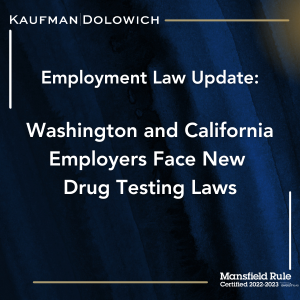Washington and California Employers Face New Drug Testing Laws, by Jason Rossiter, Esq. and Allyson Thompson, Esq., 1-25-2024
Employers in Washington State and California are facing new restrictions regarding marijuana drug testing.
At the start of the New Year, legislation took effect in both states providing certain protections for individuals that test positive for off-duty cannabis use.
The following is a breakdown of laws in both states:
Washington State
Under the statute (RCW 49.44.240), effective Jan. 1, it is unlawful for an employer to discriminate against a person in the initial hiring for employment if the discrimination is based upon:
• The person’s use of cannabis off the job and away from the workplace; or,
• An employer-required drug screening test that has found the person to have non-psychoactive cannabis metabolites in their hair, blood, urine or other bodily fluids.
Nothing in the law:
• Prohibits an employer from basing initial hiring decisions on scientifically valid drug screening conducted through methods that do not screen for non-psychoactive cannabis metabolites;
• Affects the rights or obligations of an employer to maintain a drug and alcohol-free workplace, or any other rights or obligations of an employer required by federal law or regulation; or,
• Applies to testing for controlled substances other than pre-employment, such as post-accident testing or testing because of a suspicion of impairment or being under the influence of alcohol, controlled substances, medications or other substances.
There are certain exclusions in the new law where employers may still consider off-duty cannabis use when making hiring decisions. For example, cannabis use can still be considered when filling positions requiring a federal government background investigation or security clearance, positions in the airline or aerospace industries, or positions as a corrections officer with a jail, detention facility, or the Department of Corrections. Employers can also consider an applicant’s cannabis use when hiring for a safety sensitive position for which impairment while working presents a substantial risk of death, but only if the employer identifies the requirement before the applicant applies for employment.
Also, the new Washington law does not preempt other state or federal laws that require applicants to be tested for controlled substances, such as those that apply to employers subject to federal motor carrier regulations.
California
Under the statute (AB 2188), also effective Jan. 1, it is unlawful for an employer to discriminate against a person in hiring, termination, or any term or condition of employment, or otherwise penalizing a person, if the discrimination is based upon any of the following:
• The person’s use of cannabis off the job and away from the workplace. This does not prohibit an employer from discriminating in hiring, or any term or condition of employment, or otherwise penalize a person based on scientifically valid preemployment drug screening conducted through methods that do not screen for non-psychoactive cannabis metabolites.
• An employer-required drug screening test that has found the person to have non-psychoactive cannabis metabolites in their hair, blood, urine, or other bodily fluids.
Nothing in the law permits an employee to possess, to be impaired by, or to use, cannabis on the job, or affects the rights or obligations of an employer to maintain a drug- and alcohol-free workplace, as specified in Section 11362.45 of the Health and Safety Code, or any other rights or obligations of an employer specified by federal law or regulation.
There are also certain exceptions including an employee in the building and construction trades and applicants or employees hired for positions that require federal background and clearance checks.
The bill does not preempt state or federal laws requiring applicants or employees to be tested for controlled substances as a condition of employment, receiving federal funding or federal licensing-related benefits, or entering into a federal contract.
Steps for Employers To Consider
• Update drug screening policies as necessary to ensure compliance with the new statutes;
• Consider alternative drug testing methods if they do not currently comply with the new laws;
• Update your job descriptions and clearly identify positions and job duties that may be exempt from the current statutes; and,
• Be prepared (working with counsel) to engage in an interactive process in the event an employee fails their drug test.
• Be consistent in decisions regarding retracting an offer of employment if an applicant fails a drug test.
• Make sure the people within your organization that make the decisions to hire or fire are well versed in current Washington and California laws.
If your business needs assistance updating or revising policies or engaging in an interactive process with employees, our team of skilled labor and employment attorneys can help.
Authors: Jason Rossiter is Of Counsel at Kaufman Dolowich and Allyson Thompson is a Partner. They focus their respective practices on labor and employment.










